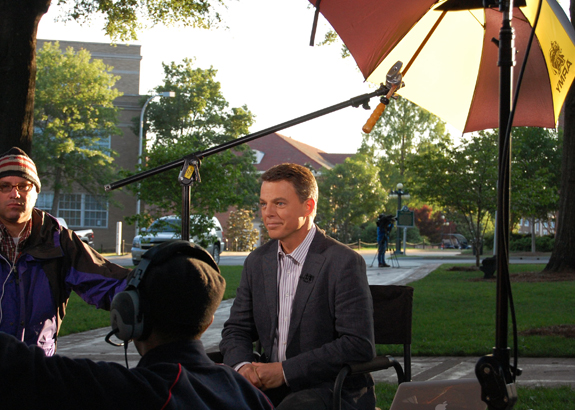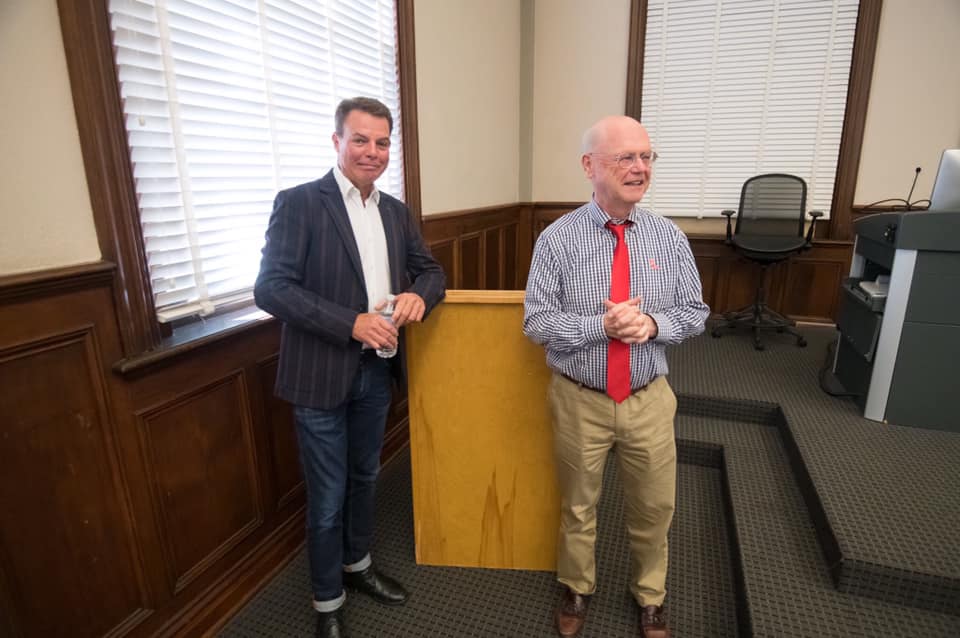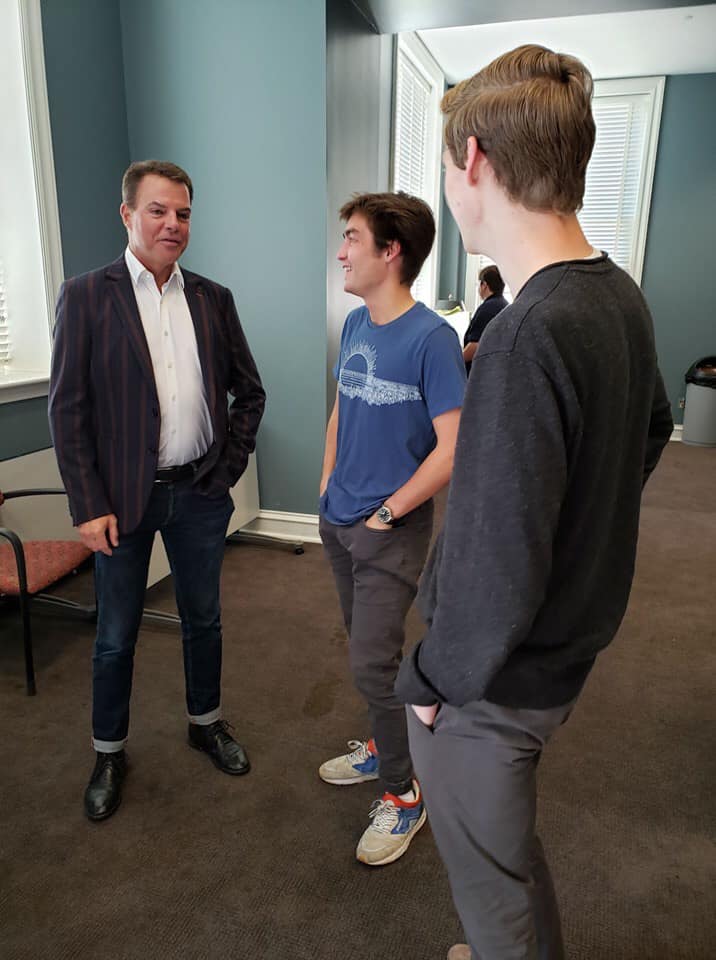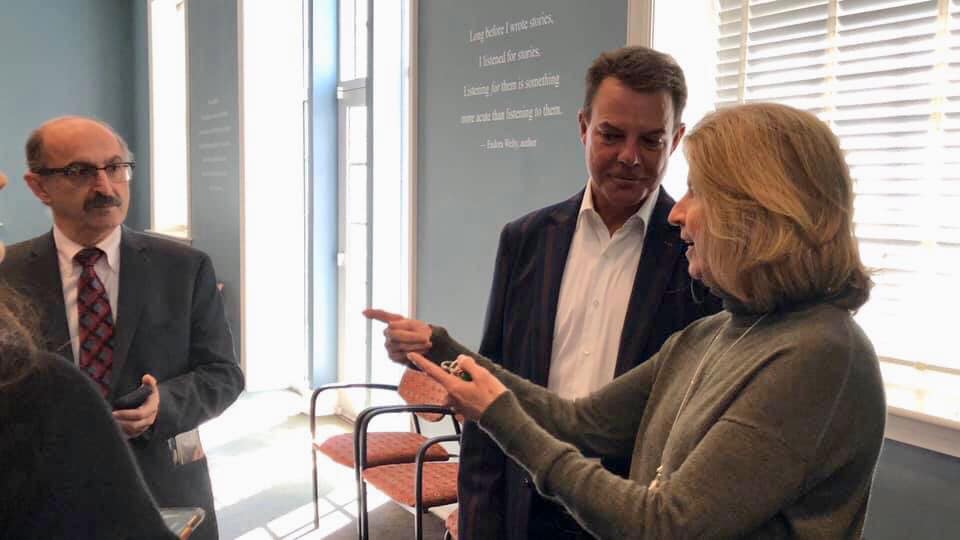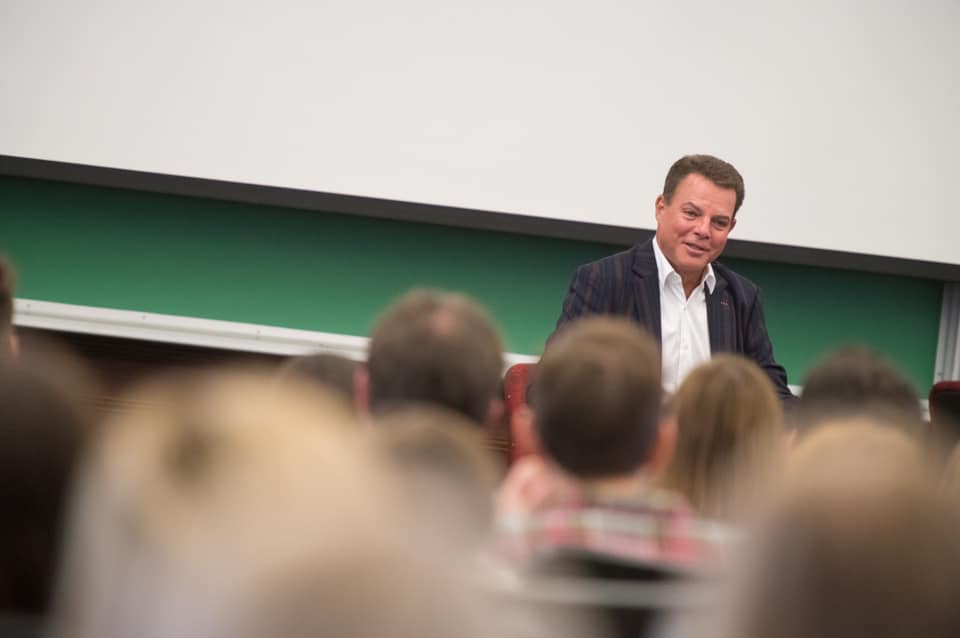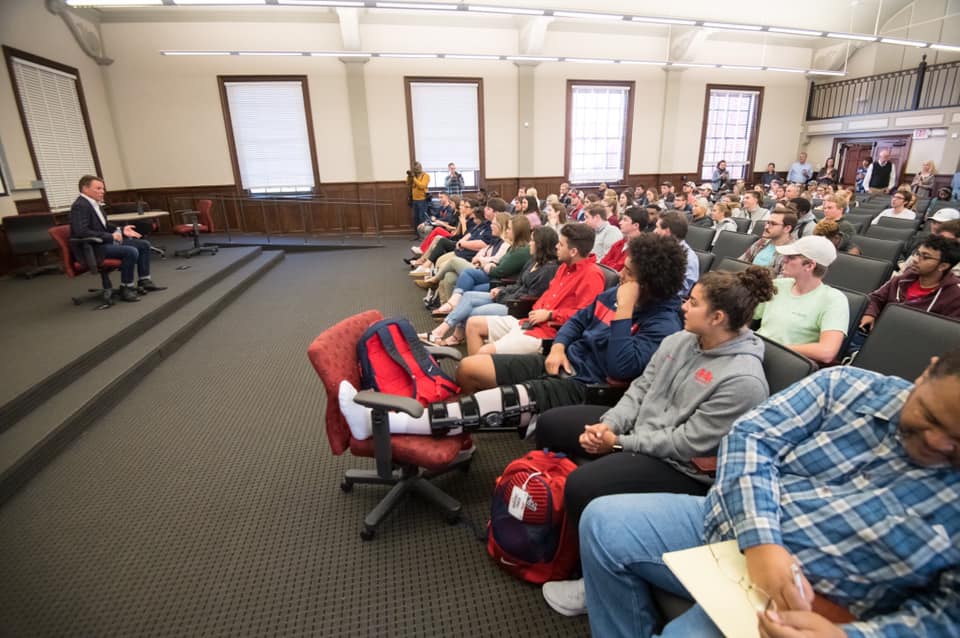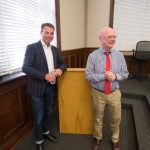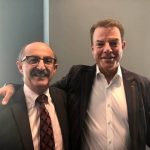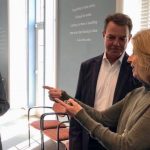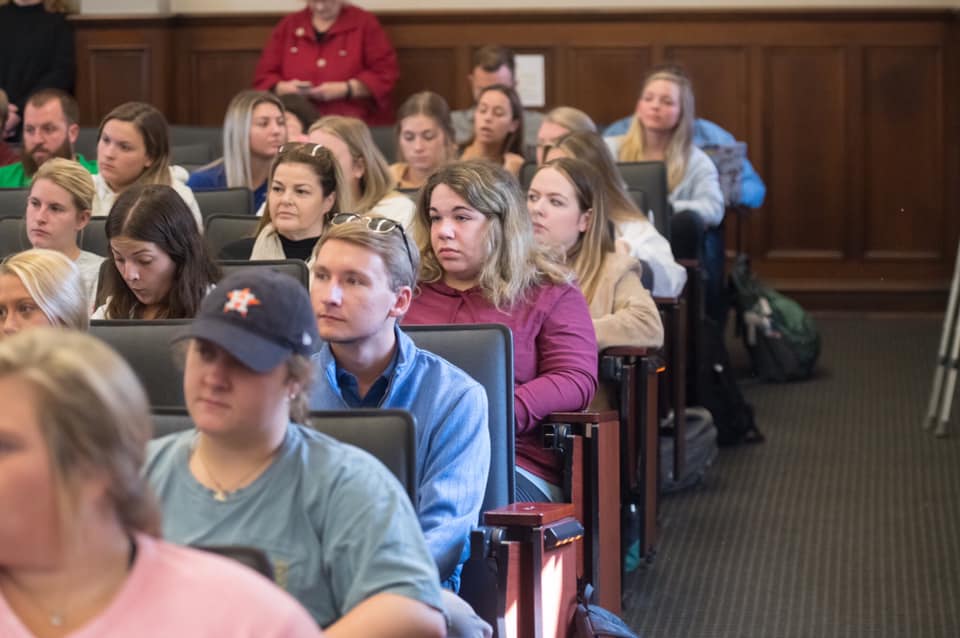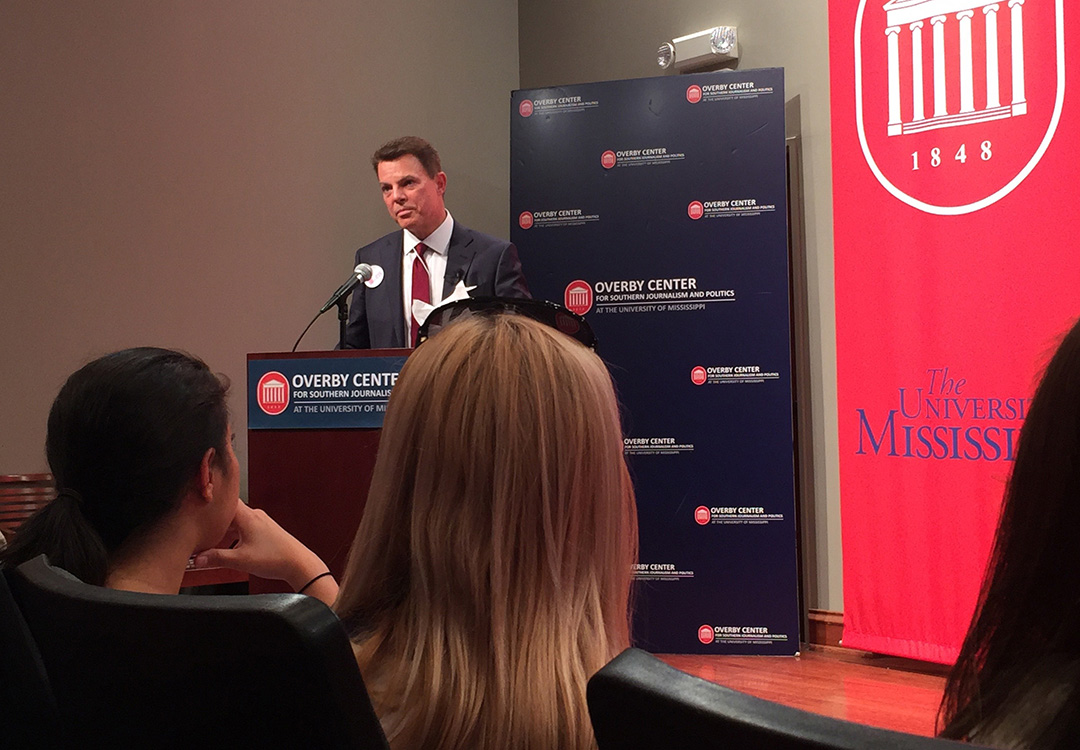
As the chief news anchor and managing editor of Fox News Network’s breaking news division, Shepard Smith has seen it all. He covered the 1997 death of Princess Diana. He was on the scene five minutes after planes deliberately crashed into the World Trade Center on 9-11.
He covered the Columbine High School massacre in 1999 when Dylan Klebold and Eric Harris opened fire on their classmates before taking their own lives. He was there when Hurricane Katrina destroyed parts of New Orleans and the Gulf Coast, making sure the nation understood the severity of conditions that ravaged the region, transforming the lives of its residents.
 At one time, Smith worked the Pentagon, the White House, Los Angeles and London, all in the same week, and he has been on the frontlines of American and international news helping write a first draft of history.
At one time, Smith worked the Pentagon, the White House, Los Angeles and London, all in the same week, and he has been on the frontlines of American and international news helping write a first draft of history.
Smith is a Holly Springs native, a New Yorker of 20 years, a Mississippian, a former University of Mississippi journalism student, and a devoted Ole Miss Rebels fan.
Because of all of those factors, he was a featured speaker at the University of Mississippi’s Meek School of Journalism and New Media’s “It Starts With MEek” conference last week, an event that promotes diversity and inclusivity. He is also gay. Smith believes his sexuality is a piece of his personal story, but not the most defining factor.
In the fall of 1979, broadcast journalism was added to UM’s journalism program. Meek School Dean Will Norton said the department was filled with print professors, but after three years of searching, they hired the late professor Jim Pratt, Ph.D., who had spent 40 years with CBS.
“He was a great man who worked hard with students outside and inside of class, and one of his first students was Shepard Smith,” Norton said. “He immediately identified Shep as this young guy who would have a great future.”
Smith left Ole Miss during his junior year of college for a Florida internship. When the school year began again in the fall of Smith’s senior year, he made a decision that caused Pratt to remark to Norton: “Shep decided to stay in Florida and take the job. He’s not going to graduate.”
“So my immediate response was: ‘Well, he’ll never amount to anything,’” Norton said.
The crowed laughed Friday afternoon as Norton spoke about Smith’s career, a journey that took him to Gainesville, Fort Myers, Miami, Orlando and Los Angeles before establishing himself in New York City.
“His reporting has been a trademark of the Fox News channel,” Norton said. “He anchors most primetime news presentations provided by Fox News. He was like so many of you (journalism students) in the 1980s. He was this energetic young guy carrying equipment around everywhere, thinking that he could make a difference, and he has.
“Through the years, we have watched him develop into this smooth, sophisticated television personality who represents the best of the profession. In the process, we have become so proud of the journalism values that Shep Smith espouses and truly grateful for his promotion of his roots on this campus.”
Smith said he’s carried many fundamental lessons learned in Mississippi throughout his career. Some came from working at a fast food restaurant, one of the most important things he said he ever did.
“I really learned about little things,” he said. “Like if you (give customers) two and three napkins instead of two napkins, you’re just screwed if that happens over, and over, and over again,” he said. “If you give them three ketchups for every (order of) fries, you’re going to go broke. So you learn these little things in life. They really translate to everything else.”
He also learned fundamental journalism lessons at Ole Miss and took a job in Panama City, Florida, in 1987 without graduating from the UM journalism program, citing an economic recession as his reason for staying with the company.
“All the time, I’m just kind of chasing ambulances and trying to find out what is going on, going to city council meetings and trying to make it relatable at a time when television is how people are getting their news,” he said. “It felt important to me at the time … I wanted to operate in the public interest … and I wanted to be their eyes and ears, and let them know what’s happening, so they could decide what they think about what’s going on in the world.”
Smith was bitten by the news bug as a child while sitting at the breakfast table. His family often disagreed about the Vietnam War.
“All that time, I was thinking, if I could just get over there and find out what’s happening, and let mom and dad know, we could avoid these discussions,” he said. “You know? (I was a) little kid.”
He was also influenced to become a reporter by Memphis news media. At the time, Smith said Channel 5 had the first live truck in Memphis.
“Memphis is the greatest, biggest city in the world if you are coming from Holly Springs,” Smith said, as he recalled watching the live broadcast of Elvis Presley’s funeral. “We had never ever, ever, ever seen this (a live truck broadcast.) No one had ever seen this. I mean, we’d seen something from somewhere with Eric Sevareid or someone, but nobody local had ever been live in my world.
“And I’m immediately like, ‘Oh s—. Now I can actually do this. I might be able to get over there and find out what’s happening in Vietnam, and let the parents know about it. I really might. And that’s when I decided this is what I want to do.’”
Smith said Pratt helped professionally mold him. One of his first assignments – investigating how long the burgers were left sitting out at the Union Grill. “I think some heads rolled over that, if I remember,” he joked.
After working in Florida, he landed a job at “A Current Affair,” a self-described “disaster.” Overwhelmed by work and never home, he rarely spent a night in his apartment for a year and a half after moving from Los Angeles to New York.
“I was still getting carded when I came into my own building,” he said. “So I’m just traveling, traveling, traveling and popping up all over the world, because we didn’t have enough people. And other people needed to get home. They needed to get home to their dog, or their children, or their wife, or their husband. And I didn’t need to do that. I needed to sort of escape what my own reality might have been, because I wasn’t answering my own questions, or even posing my own questions to myself about what it is that is different about me.
“I’m really not different. I really like all the same stuff y’all boys like. All of it. But I am different.”
Smith hadn’t questioned his sexuality at the time.
“That’s sort of how I rolled,” he said. “And that’s why it wasn’t until seven, or eight, or nine years ago, I started living my truth. I grew up in Holly Springs. I went to the First Methodist Church. I went to Ole Miss. You know what we do. We wear khakis and startched white shirts, and we all do what everybody else does. And Hotty Toddy!
“That’s exactly what we do. Y’all wear dresses. We wear khakis. We are drunk by 10 p.m.,” he joked. “‘I’m not making that 8 o’clock (class). What are you doing on Friday?’ I didn’t get it. And on top of that, I was also trying to avoid what having a normal social life is. I didn’t need to go home and find my girlfriend or boyfriend, I just cut it off (and said): Where do you want me? Next plane?”
Because of that, Smith witnessed much of modern history. He even missed his sister’s wedding to cover convicted Oklahoma City bomber Timothy McVeigh’s execution by lethal injection.
“Nobody was going to outwork me, and no one did,” he said. “If they wanted me to shoot it, I’d grab the camera and shoot it. I worked hard and kept going, and going, and going.
“I really hit it hard, and I was crushing everybody. My bosses were really so astounded. They were like how can you do this? … At one point, they were like: ‘You have to sleep. You can’t continue to stay up.’”
Smith said he never hid his sexuality. He just avoided the question. There were too many consequences.
“A. You’re going to hell for it,” he said, listing the reasons he avoided the subject. “B. You’ll never have any friends again. C. What are you going to tell your family? And by the way, you’re on television on the craziest conserative network on Earth,” he joked.”That will probably put you in front of a brick wall. Of course none of that was true, but that’s how it felt.”
One day, he decided to confront his fears. He talked with his closest friends, and began to live his truth.
“Someone asked me if Roger Ailes (founder and former chairman and CEO of Fox News and the Fox Television Stations Group, who resigned in July of 2016 following allegations that he sexually harassed female colleagues) had been abusive to me, and I said, ‘No. He was always good to me,’ and that was the truth. And when I told the truth, I guess it was considered that I outed myself. I didn’t even think about it, because I didn’t think I was in.”
Smith said his sexuality is both important and a non-issue.
“I don’t think about it,” he said. “It’s not a thing. I go to work. I manage a lot of people. I cover the news. I deal with holy hell around me. I go home to the man I’m in love with. I come home to my family.”
He joked that he’s moved on to more important battles, like Ole Miss sports.
“Now, I just want to win on Saturdays,” he said, receiving applause from the audience. “That’s all I want to do. I don’t even care about the bowl. I just need to beat LSU. ‘Go to hell LSU.’ My dad likes that,” said Smith, whose father was sitting on the front row in the Overby Center auditorium.
Because diversity and inclusivity is the focus of “It Starts With MEek,” Smith addressed the issue of stereotyping others.
“The big black guy in the back is not always the criminal, and the little white girl in the front is not always the victim,” he said, again receiving applause from the audience. “That’s really ingrained in us.”
He said goth kids who wore trenchcoats were unfarily stereotyped after the Columbine shootings.
“Dylan and Eric,” he said. “They were different kids who were stereotyped. I am in no way making excuses for them. They ruined lives. They changed my life … But a lot of kids who kind of like the goth thing or might think it’s cool to wear a trenchcoat, had to suffer after that.”
Muslims are now being stereotyped because of 9-11.
“They didn’t do that,” he said. “People who bastardized that religion brought that thing down, and started this conflict. It’s not about religion, but we’re turning it into that because that’s what they want us to do.”
Smith rejects any personal stereotypes people may assign him. On the weekends, he said you’ll find him at Vaught Hemmingway.
“I’m not playing your stereotypes,” he said. “I’ll be there. And later, I need to watch ESPN the rest of the day. And tomorrow, I need to think about it.”
Concerned about Jackson’s leadership, Smith said he’s glad UM is setting a progressive example for the state. “We have a special responsiblitiy as people from this place to go out and show the world with our deeds and our actions that we are very inclusive, and we want everyone who is good to be here, and the rest of y’all can go,” he said, receiving applause. “…We’ve done a fantastic job. It’s not easy. This place is littered with landmines. Yet, they’re getting it done.”
He’s embarrassed by the Confederate emblem on the state flag and believes the flag should be retired to a museum.
“You can’t be much of an activist when your job is to report the news,” he said, “but you can remind people what happened under that flag. … So it’s got to go. Put it in the museum. Don’t get rid of it. Make it part of your curriculum. Talk about it. But get it out of the stadium. Get it out of the grove. Get it out of my state.”
Smith later answered audience questions, including what’s your best advice for getting a job in New York City. His answer: Get a job somewhere else first, because New York City is different.
“We operate faster, and we speak different,” he said. “… Everything about life has a way, and no one tells you what it is. And if you’re real polite, (they) hate you, because it gets in the way. There’s no time for it … ‘No, I’m not going to look you in the eye.’”
Those are foreign ideas to most Mississippians and Southerners, he said.
“You have to work somewhere else where they don’t care about you first,” he said. “… It’s not that we don’t like each other. We’re just very busy, and in a really big hurry. We’ve got to get to that train. We’ve got to get to that elevator. Back on that train. Back on the elevator.”
He believes there are advantages to living in Mississippi.
“There are plenty of things that we’re just ruling on,” he said. “And that’s one of the reasons I’m so proud of this place. Because one of the things that Ole Miss has done through all their struggles is give our kids a chance. We’re educating our children here, and some of our children are willing to stay here and make our state a better place. And I think I can say really without bias, more as an observation, people who come out of this place tend to do really well.”
Smith said he wrote in his high school yearbook that he wanted to have a journalism career in Nashville, but they kept turning down his audition tape. He had never been west of Texas or north of the Carolinas when he graduated high school, but his inexperience didn’t hinder or confine him. It gave him a unique life perspective.
“I felt like my Holly Springs upbringing … we had it great,” he said. “But it wasn’t like we were rolling in dough or traveling around the world anymore than anyone else was … I didn’t realize it until I got to New York that all my friends were Ivy League kids, and they’re all millionaires, and they all know governors and … I was like: ‘Holy crap. I’ve led a deprived life,'” he laughed.
He said never let a small town limit your dreams.
“If you are from Eupora, or Iuka, or Mount Pleasant, or Hickory Flat – you can do whatever you want, and what you’re supposed to do is go do it and bring some of it back here, because this really is our only hope,” he said. “Our institutions are our only hope. Our government is regressive, and our institutions are progressive.”
Smith has accomplished a lot in his journalism career, but he said he’s always been grounded by Mississippi.
“I sort of kept my Mississippi/Ole Miss sensibilities about myself,” he said. “I didn’t (think) I had become something because I moved away from here. I think I was something because of the foundation I got here … (There’s) something about … home … that we kind of know that other people don’t. Right? I think we get that in ways other people don’t.”
You can also read The Clarion-Ledger version of this story here.
– Story by LaReeca Rucker
